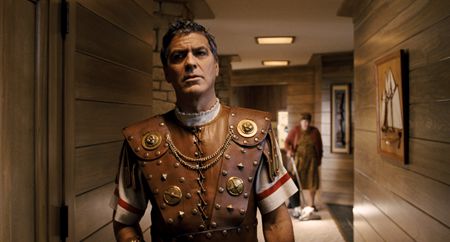Film (2016)
Written and Directed by Joel and Ethan Coen
With Josh Brolin (Eddie Mannix), George Clooney (Baird Whitlock), Alden Ehrenreich (Hobie Doyle), Ralph Fiennes (Laurence Laurentz), Scarlett Johansson (DeeAnna Moran), Tilda Swinton (Thora Thacker/Thessaly Thacker), Frances McDormand (C. C. Calhoun), Channing Tatum (Burt Gurney), Jonah Hill (Joseph Silverman)

in “Hail, Caesar!”
Photo: Courtesy of Universal Pictures
Copyright: © 2015 Universal Studios. ALL RIGHTS RESERVED.
This hilarious send-up of the Hollywood of the 1950s has just about everything in it, including Scarlett Johansson as a mermaid in the Esther Williams vein and George Clooney as a Roman centurion in the movie within the movie, itself titled “Hail, Caesar: A Tale of the Christ.” The only thing it is missing is the Jews running the studios, which, in fact they did, but which the film, seemingly intentionally and adroitly, chooses to soft-pedal.
Jews do show up, but more subtly and indirectly, as a rabbi called in to offer his opinion along with that of three Christian clerics, on the narrative of the “Ben Hur”-esque epic about the conversion of Clooney’s pagan hero to Christianity.
A bunch of communists also enters into the story, but there, as well, the Coens do not over-accentuate the Jewishness of that crowd.
Instead, who should turn up among them but Herbert Marcuse, a Jewish émigré from Germany and a noted member of the Frankfurt School of social and political philosophy. With that little improvisation on history, the Coens add a subtle and interesting twist on the role of Jews in relation to Hollywood. Marcuse’s close Jewish colleagues, Theodor Adorno and Max Horkheimer, Marxists but not communists, actually wrote compelling and quite critical essays on the role of Hollywood producers and the popular culture they created in the development of Western bourgeois society.
The central figure in the film is a studio executive named Eddie Mannix, played deftly and with a wink by Josh Brolin, named after an actual studio “fixer” who handles stars and their egos. Mannix, who really was at MGM, worked under the auspices of Nick Schenk, another historical figure never seen in the film. Mannix was Catholic, portrayed in the film attending confession every day, despite bringing up only the barest of transgressions.
In the background, historically, were not only Schenk, who was Jewish, but also the better-known Jewish MGM executive, Louis B. Mayer. Both of them had been brought, not happily, under the same roof by Marcus Loew, another Jew, the founder, in addition to MGM, of Loewe’s theaters. Despite the deeply embattled relationship between Schenk and Mayer, the Coens choose not to focus on these studio heads nor to highlight the strong Jewish influence in the industry but to accentuate the wide variety of characters populating the front lines of film production.
There we encounter the stars – Clooney’s centurion and Johansson’s mermaid – as well as a cowboy star played with delightful hokeyness by Alden Ehrenreich, and his wonderfully finicky director played exquisitely by Ralph Fiennes. As well, we get Frances McDormand as an intense and bedraggled film editor and Channing Tatum as a fleet-footed Gene Kelly stand-in doing a sailor-on-shore leave production number.
The most exquisitely humorous scene in this nonstop funny film, however, is the discussion among the clergymen. With subtlety and wry wit, the Coens pit the rabbi against the three Christian clerics in a way that makes his views stand out in comic relief and considerable distinction from the rest.
Hearkening back to the exquisite portrayal of three rabbis in the Coens masterful and partially autobiographical “A Serious Man” (2009), the scene poignantly but humorously condenses the Jewish sensibility into a few potent remarks. Despite its relative brevity, it’s really a great and subtle tribute to the role of Jews in cinema – a deft appreciation of the way in which the sigh, the shrug, the insightful remark delivered with just enough sarcasm, conveys, with sleight of hand rather than broad strokes, a sense of the adroit sensibilities which provided the impetus to an entire world of wild entertainments.
– Originally published as Hollywood Without Jews? Not Exactly by Charles Munitz (aka BADMan) in the February 19, 2016 issue of The Jewish Advocate.
(Another, more generic, review of Hail, Caesar! in Boston Arts Diary.)
Leave a Reply